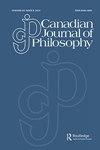Permissive Divergence
IF 1.7
2区 哲学
0 PHILOSOPHY
引用次数: 0
Abstract
Within collective epistemology, there is a class of theories that understand the epistemic status of collective attitude ascriptions, such as “the college union knows that the industrial action is going to plan” as saying that a sufficient subset of group member attitudes has the relevant epistemic status. I will demonstrate that these summativist approaches to collective epistemology are incompatible with epistemic permissivism, the doctrine that a single body of evidence may rationalize multiple doxastic attitudes. In particular, we can use epistemic permissivism to generate so-called divergence cases, which demonstrate situations in which rationality requires group-level and member-level attitudes to diverge.
放任分歧
在集体认识论中,有一类理论将集体态度描述的认识论地位(如 "大学工会知道工业行动将按计划进行")理解为群体成员态度的充分子集具有相关的认识论地位。我将证明,这些集体认识论的总结主义方法与认识论允许主义(epistemic permissivism)是不相容的,认识论允许主义认为,单一的证据体系可以使多种叩问态度合理化。特别是,我们可以利用认识论允许主义来产生所谓的分歧案例,这些案例展示了理性要求群体层面和成员层面的态度出现分歧的情况。
本文章由计算机程序翻译,如有差异,请以英文原文为准。
求助全文
约1分钟内获得全文
求助全文

 求助内容:
求助内容: 应助结果提醒方式:
应助结果提醒方式:


